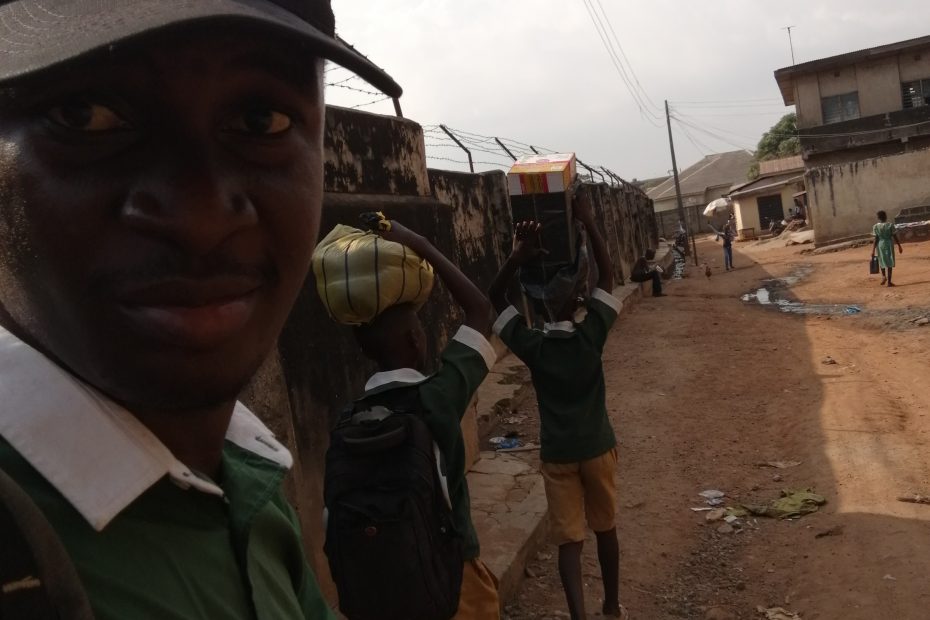‘…more than gifting clothes and food items, EDUCATION and EMPOWERMENT is most important in getting disadvantaged people out of extreme poverty.’ – Olalekan Abiola
In December 2020, a rather distressing situation unfolded right within the walls of my classroom, and it left me deeply moved. It came to my attention that some of my students were arriving at school with empty stomachs, enduring hunger until they returned home due to the stark poverty affecting their families. This heartbreaking reality had a significant impact on their ability to learn, as many of them struggled to stay awake during class and found it hard to focus.
Motivated by a genuine desire to make a positive change, I turned to the power of social media to seek help. Thankfully, I managed to secure enough funds to purchase essential food items for these struggling families. Taking a hands-on approach, I personally delivered these provisions to the homes of these students, allowing me to not only provide relief but also connect with them and their families on a more personal level.
However, the eye-opening experience I had when visiting these communities and their households revealed the complexity of the issue. Their living conditions were not just substandard; they were utterly deplorable, and it was evident that no one could thrive in such conditions. It became clear that providing temporary relief in the form of food and clothing, while important, was only a temporary fix. Without addressing the root causes, these families would continue to struggle.
“a man’s wealth is not in the purse he carries. A fat purse quickly empties if there be no golden stream to refill it” – The Richest Man in Babylon
After much contemplation, I came to the conclusion that beyond the immediate assistance of clothes and food, the most crucial factors in lifting these people out of extreme poverty were EDUCATION and EMPOWERMENT.
Education
The fundamental purpose of education transcends mere knowledge acquisition; it encompasses the holistic development of an individual, equipping them with the requisite knowledge, skills, values, and personal growth. This broader perspective on education underscores its critical role in shaping an individual’s mindset, fostering conscious growth, and ultimately enabling them to make meaningful contributions to society.
In the context of underserved adult communities, providing targeted education and skills training tailored to their specific occupations or trades holds immense transformative potential. For instance, an artisan may not require a return to conventional classrooms for academic pursuits. Instead, they can benefit significantly from education that hones their technical skills while also addressing the business facets of their trade. This multifaceted approach can encompass aspects like cultivating a mindset of excellence, mastering the art of packaging, and effective marketing strategies.
A notable example of this comprehensive approach to education can be gleaned from Ayodeji Fakolade, who offers valuable insights. He emphasizes that being a computer hardware engineer is not merely a skill; it constitutes an entire business ecosystem. Through astute entrepreneurship, one can build an empire around their skill, create value, disseminate knowledge to others, and amass wealth over the long term. This paradigm can be extrapolated to virtually any skill set, reinforcing the idea that education serves as a powerful catalyst for personal growth, economic empowerment, and societal progress.
In conclusion, education’s profound impact extends beyond the conventional realms of knowledge acquisition. It plays a pivotal role in shaping individuals, elevating communities, and fostering a culture of lifelong learning and innovation. By tailoring education to the specific needs and aspirations of individuals, we can unlock their full potential and drive positive transformation on multiple fronts.
Empowerment
Empowerment, from my perspective, revolves around the strategic allocation of financial resources and essential assets to individuals entrenched in severe poverty. This empowerment seeks to facilitate the establishment and growth of their businesses or trades by equipping them with the necessary tools and equipment. In essence, it aims to bridge the resource gap that often hinders their economic progress.
The integration of education and empowerment, when complemented by effective mentorship, presents a multifaceted approach with profound potential to effect transformative change within marginalized communities. This approach not only addresses the visible symptoms of poverty but also delves into the root causes, offering a comprehensive solution. Education serves as the catalyst, imparting the knowledge and skills needed to navigate complex economic landscapes, while empowerment provides the financial means to translate that knowledge into tangible progress.
By combining education and empowerment, we create a synergy that can break the cycle of poverty. Education equips individuals with the cognitive tools to make informed decisions, fostering financial literacy and entrepreneurial acumen. Simultaneously, empowerment furnishes them with the tangible resources required to implement those decisions effectively.
In sum, the symbiotic relationship between education and empowerment emerges as a potent strategy for sustainable poverty alleviation. It addresses not only the immediate economic challenges faced by marginalized communities but also cultivates the long-term capacity for self-reliance and upward mobility. This holistic approach represents a paradigm shift in our efforts to bring about lasting and meaningful change in the lives of those who need it most.
Are there other important points to note in bringing people out of poverty? Please share with me in the comment section.

The United nations sustainable development agenda is to achieve development without truncating the chance for future generations to enjoy life as well and education is the key to achieving that balanced life. Education is a tool to enlighten the human mind and enable It to conceive ideas which will facilitate growth and development, in other words, growth, development, and poverty reduction depend on the knowledge and skills that people acquire. Thanks to the interconnectivity of the goals, sustainable development can be achieved.
I believe that empowerment will go a long way.
Which I have in my plan to do as a fashion designer.
Secondly, It has to do with mindset,
I suggest that mentoring them too